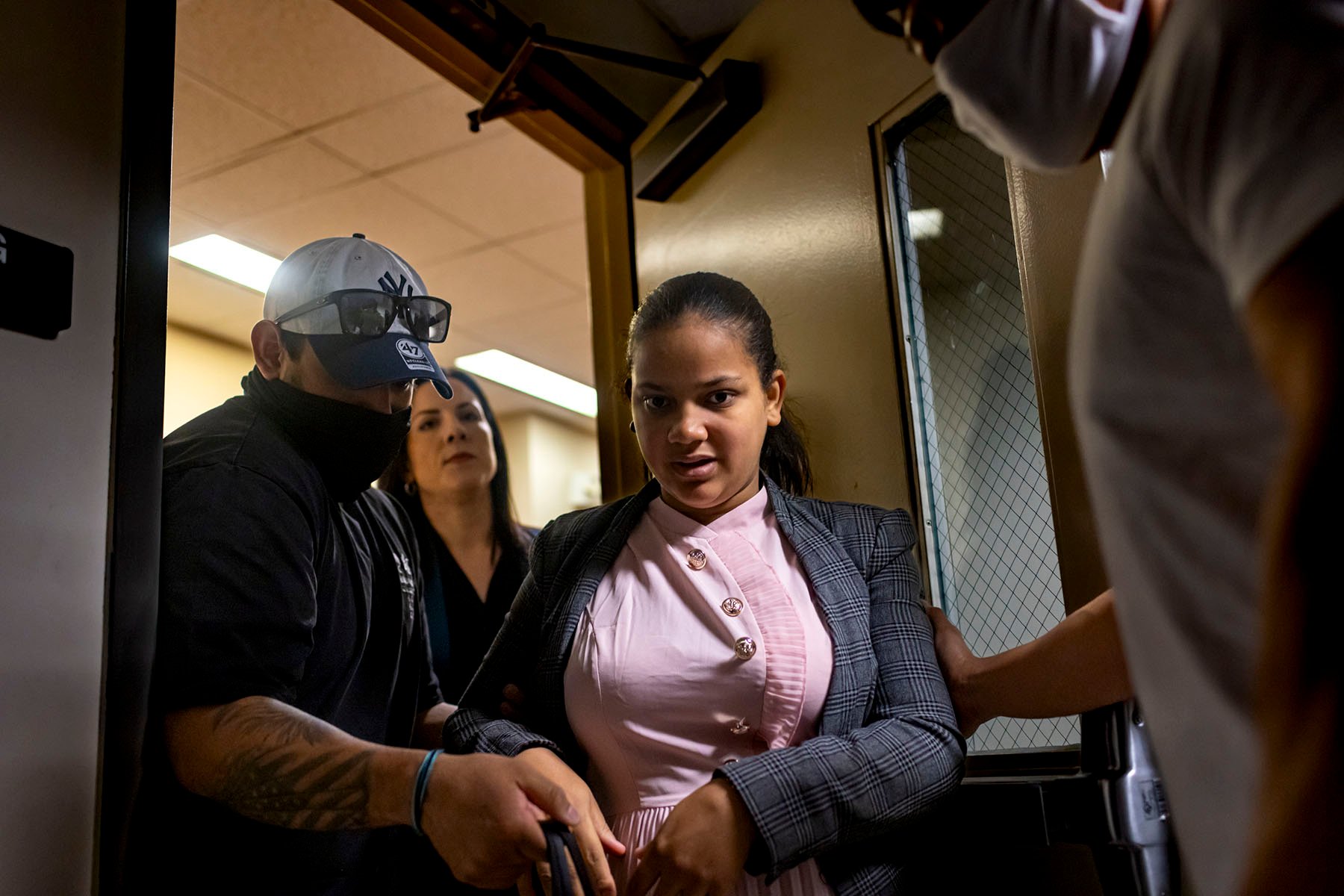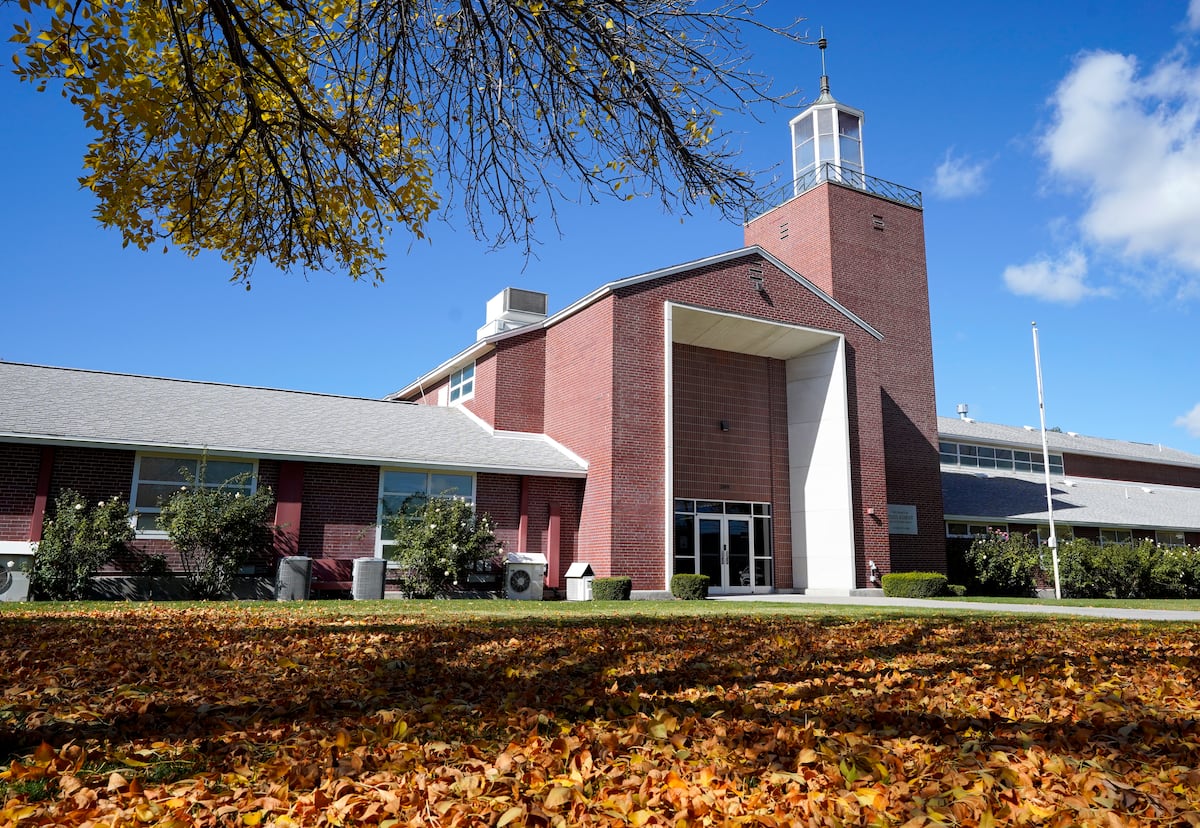Copyright The 19th*

Cary López Alvarado, of Hawthorne, California, was nine months pregnant when she was arrested by immigration officials alongside her husband, an immigrant from Guatemala. Alvarado was held overnight but was never sent to a detention facility: After taking her into custody, ICE learned she was a U.S. citizen. Immediately after her release, she began to experience sharp pains in her stomach, according to a claim she filed against the federal government. She gave birth a few days later. Angie Rodriguez, an immigrant from Colombia, was taken into Immigration and Customs Enforcement (ICE) custody following a routine check-in with immigration officials in July, and soon after found out she was pregnant. At the Mesa Verde ICE Processing Center where she was held, Rodriguez could hardly bring herself to eat the small meals that the detention facility served because of how they looked and smelled, and her only other option was buying processed food like instant noodles and chips. Rodriguez went on to miscarry while in custody, according to a lawsuit she filed against the federal government. Antonia Aguilar Maldonano, a mother of two from El Salvador, was arrested by ICE on her way to work and detained at the Kandiyohi County Jail in Minnesota for almost a month. Her youngest child is 22 months old and still nursing; he has acid reflux and an allergy to other forms of milk. The jail was not equipped to house someone who was nursing, said Gloria Contreras Edin, her lawyer: It did not have a breast pump when Aguilar Maldonado arrived, forcing her to use her hands to massage milk out until the facility was able to buy a pump. Lawyers successfully argued for her release on bond — $10,000, paid for by members of her church — while the government makes the case that she be deported. A Biden-era policy restricts ICE from arresting or detaining immigrants who are pregnant, postpartum or nursing, except in extreme circumstances. While President Donald Trump has not formally rescinded the policy, it’s clear from lawsuits, news reports and advocates for immigrants who are detained that it’s not being followed. Quantifying the exact number of pregnant, postpartum or nursing immigrants in custody has become impossible: This March, Congress let lapse a requirement that the administration report twice a year on how many of these immigrants are being held in immigration facilities. Since the fall of 2019,, Congress had required the Department of Homeland Security to publicly report the count every six months and include “detailed justification” for every single detained immigrant who was pregnant, postpartum or nursing. ICE did not respond to The 19th’s request for this data. While the agency said in a statement in August that pregnant immigrants are receiving sufficient care in custody, medical professionals say the conditions in these facilities can heighten the risk for complications. Limited food can impact nutrition at a vulnerable time; access to medical appointments is spotty and often not aligned with standards of care; and pregnant, postpartum and nursing detainees also face the stress of arrest and separation from their families. The impact of arrests and detention In 2021, following public outcry against the first Trump administration’s immigration policies, the Biden administration directed ICE not to detain pregnant, postpartum or nursing people except in “exceptional circumstances” — they are a national security threat or pose immediate harm to themselves or other people. Those who are detained are supposed to be held in facilities suited to appropriate health care. ICE-employed medical professionals are supposed to provide weekly updates on those detainees to relevant agency directors. The ICE Health Service Corps is also supposed to keep consistent records of all pregnant, postpartum and nursing detainees, providing monthly updates to the organization’s leadership. Since returning to the White House, Trump has not formally rescinded that policy, but administration officials argued in court that he had done so implicitly through a sweeping anti-immigration executive order that supercharged immigration enforcement. A federal judge refuted that argument, but on its website, ICE says the policy is “not reflective of current practice.” “We’re seeing more pregnant women detained again after not seeing much of that, at least not in ICE detention,” said Amanda Heffernan, a longtime nurse-midwife and professor of midwifery at Seattle University. Rebecca Cassler, an attorney at the American Immigration Lawyers Association, said her organization’s pro bono program has seen an increase in cases of detained pregnant, postpartum and nursing people. She says no one outside ICE really knows how many, but it’s enough to make her “very concerned.” Though the federal government has not made public how many pregnant people have been detained, Democratic lawmakers have published multiple investigations documenting known cases. One report, published this summer by the office of Sen. Jon Ossoff of Georgia, identified 14 credible cases of pregnant women being mistreated in detention facilities. The report included a description of pregnant women sleeping on cell floors, one detainee being told to “just drink water” when needing medical support, and another miscarrying alone after days of bleeding. ICE has disputed the report. ”Pregnant women receive regular prenatal visits, mental health services, nutritional support, and accommodations aligned with community standards of care. Detention of pregnant women is rare and has elevated oversight and review. No pregnant woman has been forced to sleep on the floor,” ICE said in a statement on its website. A September 18 letter signed by 29 Democratic senators and addressed to Homeland Security Secretary Kristi Noem directed federal officials to clarify just how many pregnant, postpartum and breastfeeding people are being detained, how many have been deported and what health care is being made available to them. DHS has not acknowledged receipt, said a spokesperson for Sen. Patty Murray, a Democrat from Washington who organized the letter. “We do not know how many pregnant women are in ICE custody, whether U.S. citizen babies have been born in ICE custody, and what provisions have been made for mothers’ and children’s health, safety, and wellbeing,” the senators wrote. The Women’s Refugee Commission, an advocacy group, is seeking records from Homeland Security pertaining to pregnant, postpartum or nursing individuals who have been detained. It recently launched its own independent tracker, encouraging health providers, lawyers and family members to submit information about pregnant people who have been detained. The commission said it’s too early to provide an accurate count from its tracker. Zain Lakhani, a lawyer and director of migrant rights and justice for the commission, said credible reports of pregnant people being detained suggest a frequency higher than ICE’s policy would suggest. “It would be shocking that we would be able to have this level of detained pregnant people under the guidance,” she said. “We are seeing just this shocking number of detained postpartum and pregnant women.” Workers helping integrate deported immigrants in Honduras told researchers from the Women’s Refugee Commission that nursing women who were deported had not received enough food and water to continue lactating. “They arrive with hardly any milk — or milk that looks like water — and this affects the babies’ weight,” one worker said, according to a report published by the organization. The impact of arrests and detention By the time Aguilar Maldonado left the jail, her breast milk had started to dry up, Contreras Edin said. She is particularly worried about the impact of detention on her children, who were not with her and now follow her wherever she goes, including to the bathroom. Her boyfriend has been deported; she is asking a judge to let her leave voluntarily — a process that has fewer legal penalties than being deported — so she and her children can follow him. “Her children were traumatized and her youngest was especially traumatized,” Contreras Edin said. “That bond was broken during detention and that left a permanent impression on her children.” There is no way to ethically research how detention specifically may affect pregnancy outcomes, including whether it could increase the possibility of miscarriage, said Dr. Carolyn Sufrin, an associate professor of obstetrics and gynecology at Johns Hopkins University who studies the reproductive health of incarcerated women. But evidence does show that physical and psychological strain — the kind people can suffer while detained — threatens the health of a pregnancy and can mean greater risk of preterm birth. “I’m very concerned because of the conditions we’ve already heard about that could be increasing the risks of adverse outcomes,” Sufrin said. “I’m very concerned about the outcomes for these moms as well as for the outcomes for their babies.” ICE did not respond to a request for comment on the conditions or available accommodations for pregnant, postpartum or nursing immigrants. Alvarado, who is seeking $1 million following her arrest, citing “the unconstitutional conduct, unlawful arrest, and the tortious conduct of Border Patrol and ICE agents,” said her daughter is healthy and growing. But she’s still dealing with the aftermath of her detention. Footage of the arrest shows federal agents holding her hands behind her — despite guidance advising that officers generally not use physical restraints on pregnant people and that, if they do, they should keep a pregnant person’s hands in front. Her husband has now been deported, and Alvarado has no income. She’s watching her savings dwindle and relying on her family to help care for her little girl. She said she was unsure if she’d have to pick up multiple jobs to make ends meet — and if so, who would be able to care for her infant. She remembers the terror she felt while in government custody. “Every time I see a news or video, it does rewind in my head,” she said. “It does get me very emotional, seeing stuff like that.” Victoria Petty, an attorney with the Lawyers’ Committee for Civil Rights of the San Francisco Bay Area who is representing Rodriguez — the woman who suffered a miscarriage in detention — said that she first connected with her client’s husband in late August, about a month after his wife’s detention. He had left Petty a voicemail and text explaining that his wife was pregnant in a detention center and that he was really worried about her. Days later, he called again. “He’s crying on the other line, and he’s like, ‘She had a miscarriage. I don’t know what to do. She’s in the hospital. Help,’” Petty recalled. Rodriguez described in court records being “unignorably hungry” inside the Bakersfield, California, detention facility and lacking prenatal health care and education for weeks after her pregnancy was confirmed. Eventually, she began to see brown discharge and was taken to an off-site hospital where, days later, health care providers confirmed she had miscarried. Petty moved quickly to file a lawsuit claiming unconstitutional detention. Court documents show that upon release from the hospital, Rodriguez was placed in medical isolation at the ICE detention center. “It was very scary. She was in pain. So after this really traumatic experience, and her going to the hospital and confirming that they did not see the fetus on the ultrasound — after all of that, they brought her back to the detention center and put her in medical isolation,” Petty said, adding that her client was distraught. Petty said it’s hard to determine whether detention conditions caused or contributed to Rodriguez’ miscarriage, a very wanted first pregnancy. But, she said, it’s important to consider the stress of being suddenly detained in a van — her client is from Colombia; kidnappings and murders have left lasting scars on the Latin American nation — along with the strain and lack of food options in detention. “These are the conditions that she was in when she was pregnant. And we cannot rule out that having been under that level of stress and fear and having that little care contributed to her pregnancy loss,” Petty said. Heffernan, who has worked with several immigrants who were detained while pregnant, said she has seen pregnant immigrants get a few small accommodations: being placed in a lower bunk instead of the top bunk for sleep or getting extra milk with their meals and sometimes an extra sandwich or snack before bedtime. Medical care, she said, can be “very haphazard and spotty,” with prenatal appointments often not happening on schedule. “You do see people getting a prenatal visit here and there, but not in a timely fashion, and not according to the standard of care for people that are outside,” Heffernan said. “For instance, in a couple of people that I’ve been in contact with recently, one had been in detention for several months and had had no prenatal care at all. Another had had one visit.” Pregnant immigrants are also more vulnerable to more severe cases of COVID-19, flu and other illnesses, which spread quickly in crowded places like detention centers. There is an extensive list of best practices for detained pregnant and postpartum people, Sufrin said, including but not limited to regular access to comprehensive physical and mental health care, nutrition, the ability to exercise and adequate housing. But from a medical standpoint, she said, “The best practices would be not to detain them.”



